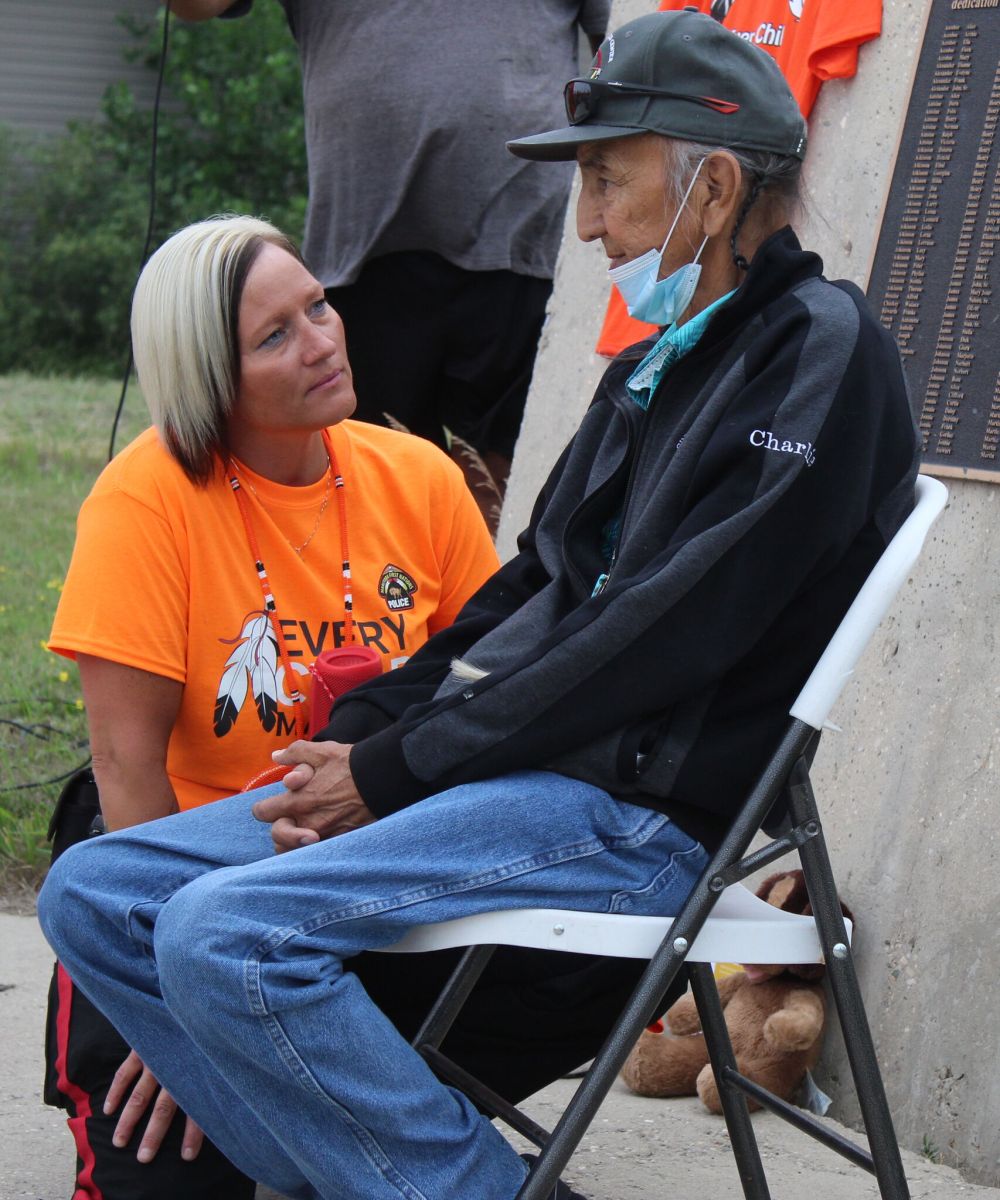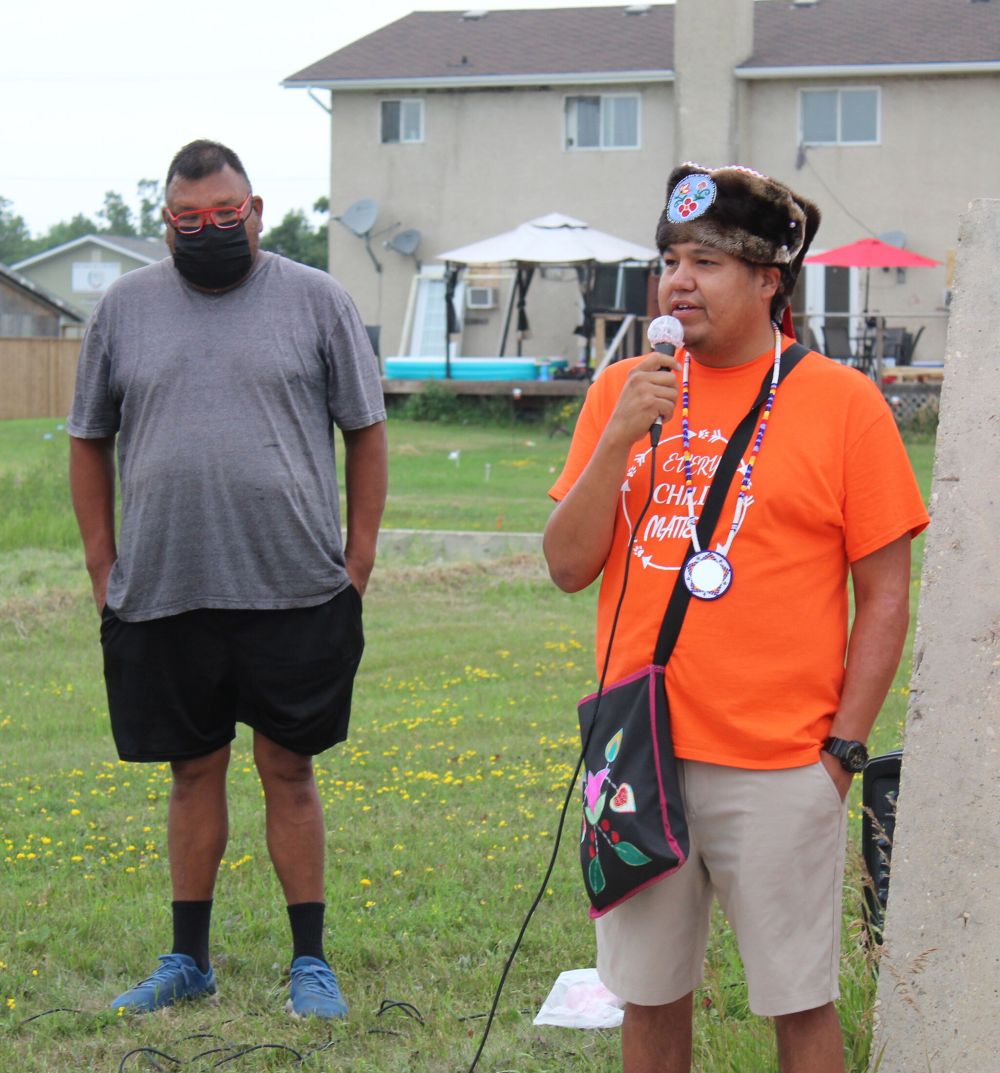Roseau River First Nation organizes Honour Walk
Advertisement
Hey there, time traveller!
This article was published 07/08/2021 (1428 days ago), so information in it may no longer be current.
More than 60 people from Roseau River Anishinabe First Nation and surrounding communities gathered on a hazy, humid morning last week to honour survivors of residential schools and remember those children who never returned home.
The July 28 Honour Walk began with a tobacco ceremony and concluded with a barbecue outside the local Manitoba First Nations Police Service detachment.
It also coincided with the start of Tribal Days, the reserve’s annual summer festival, which was divided this year into two three-day celebrations a week apart.
Sgt. Nicki Rossi said the walk sprang from meeting with the local recreation committee to discuss the ongoing discovery of unmarked graves at five former residential school sites in three provinces, including Manitoba.
Rossi called the discoveries a “tragedy” that called out for a community response.
“Community-based policing is huge in our police service, so we wanted to do something for the community and just let them know that we care,” she said.
The walk, which started at a monument to local residential school survivors, wound its way down the community’s main road, past the Ginew Wellness Centre, and through a residential neighbourhood.
Youth had spent the morning making posters for the event. A young girl carried one that read, “We are still here.”
The detachment’s summer student, Chanel Higheagle, who unfurled a large “Every Child Matters” banner at the front of the march, helped organize the event.
Higheagle said she was inspired to do so after participating in the No Pride in Genocide walk in Winnipeg on Canada Day.
Higheagle, who will enter Grade 12 at Roseau Valley School this fall, said she was pleased by the turnout, and by all the orange t-shirts, one of which was hung on the monument, next to a plaque listing the names of more than 210 residents of Roseau River who attended a residential school.
Fourteen residential schools have been identified in Manitoba, according to the National Centre for Truth and Reconciliation at the University of Manitoba.
None were located near Roseau River, so local children were sent to residential schools in Winnipeg, Sagkeeng, Birtle, Brandon, Portage la Prairie, or Dauphin, Chief Craig Alexander said.
“Our kids were taken from the road even,” he said.
At the walk, pair of children’s shoes and a teddy bear were placed at the foot of the monument to symbolize the children whose graves were discovered over the past two months.

In a speech, Alexander urged attendees to be mindful of survivors, some of whom find commemorative events stir up painful memories.
Recreation director Jason Henry encouraged people to pray for the families of missing children as they walked.
“Send them strength, so they can get by in these hard times,” he said.
Charlie Nelson, an elder and knowledge keeper, recited prayers. Nelson attended high school at Assiniboia Residential School in Winnipeg. He recalled others from Roseau River who were taken away at a much younger age.
“Some of them left when they were very young, like around six years old, maybe even as young as five years old,” Nelson said. “Some of them experienced sexual abuse and physical abuse, and some of them didn’t make it home.”
Both Alexander and Nelson spoke of the importance of preserving the Indigenous languages that the architects of the residential school system sought to exterminate.
“We have to keep working. We have to keep talking to our kids,” Nelson said.
As they prepared to walk, community members filed by to receive a pinch of tobacco, which they held to their heart then sprinkled on the ground near the monument.
Treaty 1 turns 150
Alexander said the discoveries of the unmarked graves had added pain to the lead-up to the Treaty 1 sesquicentennial.
On Aug. 3, 1871, after eight days of negotiations, Treaty 1 was signed at Lower Fort Garry near Selkirk. Roseau River, traditionally known as Okwewanashko-ziibiing, is one of seven First Nations included in Treaty 1.
In addition to the main reserve along Provincial Road 201 between Letellier and Dominion City, it includes two smaller reserves: Roseau Rapids No. 2A south of St Malo, and Roseau River No. 2B northwest of Winnipeg.

“We’re here 150 years later after signing that treaty,” Alexander said. “We are here, we’re still here, we’re going to be here forever.”
He called on the federal government to fund language revitalization programs and build “healing centres” for those battling addiction.
“It’s those types of supports that we need,” Alexander said. “We’re not going to wait.”
As he walked, Alexander said he was thankful for the ability to gather as a community after many months of COVID-19 restrictions.
“It means a lot that some of our neighbours from neighbouring communities are with us as well,” he said, noting residents of Letellier, Dominion City, and Emerson were present.
“They’ve been reaching out to us since the finding of these graves, wanting to know more, how they could help spread the word and educate,” Alexander said.
That impulse, while laudable, creates a conundrum for residential school survivors who aren’t ready or willing to share their experiences, he explained. To avoid reopening old wounds, Alexander said he never pressures anyone to share.
Once COVID-19 restrictions subside, Alexander said the Ginew Wellness Centre will host educational “lateral kindness” workshops that will focus on healing.
“I think that’s the goal for us here on Roseau River, is to break those cycles of abuse, because we were a peaceful people at one time.”
Focusing on recreation
Alexander has made youth opportunities a top priority since his election as chief in 2017. Lately, when he strikes up a conversation with young people, he’s encouraged by what he hears.
“They seem to understand more than I did at that point in time in my life,” he said.
On July 2, the community opened a brand new skatepark, located between Ginew Wellness Centre and Ginew School.

Alexander said local youth first identified the need for a skatepark in 2015.
“Some didn’t think it was going to happen,” he recalled.
Every year, the reserve receives $589,000 from the federal government for infrastructure. This year, chief and council decided to spend $380,000 on the skatepark. A basketball court was also built. A splash pad, baseball diamond, and a LED billboard for advertising community events are also in the works.
Alexander said recreation amenities like the skatepark prevent crime by warding off boredom, and also foster local talent. The skate park is also bringing in visitors to the community, including a semi-professional skateboarding collective that stopped by last month.
All summer, a crime prevention officer from the detachment is holding skateboard clinics three times a week. Alexander said the workshops are generating a lot of interest, especially in girls, who make up the majority of skateboarders at Roseau River.
Jason Henry, the reserve’s recreation director, who is kept hopping during Tribal Days, said he’s trying to promote active lifestyles after seeing kids spend the pandemic on their phones.
Now that the skate park is up and running and construction of the splash pad is underway, Henry said he is turning his attention toward fixing the arena’s ice plant, which has been broken since 1997.
This story was first published in the Aug. 5, 2021 print and e-editions of The Carillon. Become a subscriber today.
